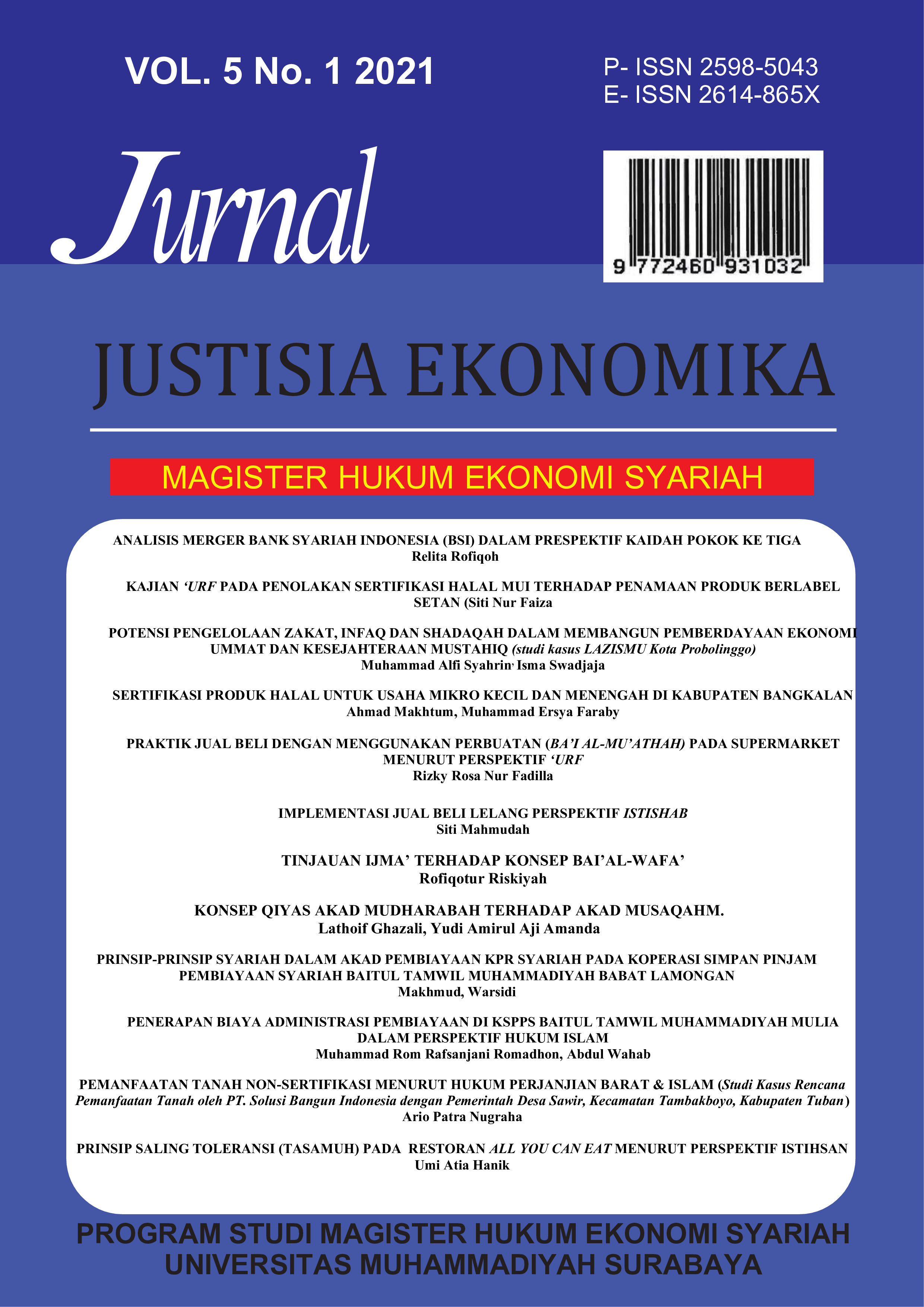KAJIAN ‘URF PADA PENOLAKAN SERTIFIKASI HALAL MUI TERHADAP PENAMAAN PRODUK BERLABEL SETAN
DOI:
https://doi.org/10.30651/justeko.v5i1.7734Abstrak
This research is the result of field research to analyze the 'urf study on the rejection of the MUI halal certification of naming “devil noodle productsâ€. In conducting research, the author uses qualitative methods by using field data and complemented by secondary data to strengthen the analysis that comes from previous research, books, journals, decrees, and others. Then, uses descriptive analysis techniques to analyse. Noodle devil is one of the spicy culinary foods that has a lot of customers but in its business journey this product did not get approval to get the halal label of the East Java MUI because the devil's name does not match "SK 46 / Dir / LPPOM MUI / XII / 14 and Fatwa MUI Number. 4 of 2003 concerning Standardization of Halal Fatwa. "Although the devil's noodle product has been known to mean spicy noodles with a level of spiciness, the custom of using the name Setan includes urf 'lafzi which is unacceptable because the word Setan is included in the category of names of Allah's enemies who are feared to keep them from remembering Allah. Based on the validity of the ‘urf naming’ of products labeled satanic, including ‘urf fasid’ which must be abandoned. From the results of the research, LP POM MUI East Java is very careful in accepting or rejecting applications for Halal Product Certification, the first step of the East Java LPPOM MUI is to assess the name or symbol on the product being proposed. If Surabaya devil noodle sellers want to get the halal label from the East Java MUI, they must change the devil's name to a good name and symbol that not lead to kufr and forget to remember Allah.
Referensi
REFERENSI
M. A. Dkk, Himpunan Fatwa Majelis Ulama Indonesia Sejak 1975. Jakarta: Erlangga, 2011.
Runiar, “Wawancara,†Surabaya, 2018.
MUI, “Standardisasi fatwa halal,†Himpun. Fatwa MUI, pp. 1–4, 2003.
Majelis Ulama Indonesia, “Ketentuan Penulisan Nama Produk Dan Bentuk Produk,†2014.
T. dan S. M. A. Jumantoro, Kamus Ilmu Ushul Fiqih. T.tp: Amzah, 2005.
A. Syarifuddin, Ushul FIqh. Jakarta: Logos Wacana Ilmu, 1997.
S. Efendi, Ushul Fiqh. Jakarta: Kencana, 2005.
F. Zainuddin, “Konsep Islam Tentang Adat,†LISAN AL-HAL J. Pengemb. Pemikir. dan Kebud., vol. 12, no. 1, pp. 145–158, 2018, doi: 10.35316/lisanalhal.v12i1.145.
A. A. Dahlan, Ensiklopedia Hukum Islam. Jakarta: Ichtiar Baru Van Hoeve, 2006.
N. Hakim, “KONFLIK ANTARA AL-’URF (HUKUM ADAT) DAN HUKUM ISLAM DI INDONESIA,†J. EduTech, vol. 3, no. 2, 2017.
A. R. Dahlan, Ushul Fiqh. Jakarta: Amzah, 2010.
A. Koto, Ilmu Fiqh dan Ushul Fiqh. Jakarta: Rajawali Pers, 2011.
D. RI, Depag RI, Al-Qur’an dan Terjemah Indonesia. Jakarta: Sari Agung, 2002.
R. M. Zionis, “Posisi Al- ’ Urf Dalam Struktur Bangunan,†J. Falasifa, vol. 2, no. 2, pp. 131–150, 2011.
M. Ahmad, Kutubut Tis’ah Kitab. .
A. Syarifuddin, , Ushul Fiqh Jilid 2 ( 2008), 423. Jakarta: Kencana, 2008.
Sucipto, “‘Urf Sebagai Metode dan Sumber Penemuan Hukum Islam,†Asas, vol. 7, no. 1, pp. 25–40, 2015.
S. Abu Daud, Hadis Sunan Abu Dawud. .
A. S. Karim, Ushul Fiqih. Bandung: Pustaka Setia, 2006.
A. Rauf, “Kedudukan Hukum Adat dan Hukum Islam,†Tahkim, vol. 9, no. 1, pp. 20–34, 2013.
A. W. Khallaf, Ilmu Ushul Al-Fiqh. Kairo: Dar al-Qalam.
T. Andiko, Ilmu Qowa’id Fiqhiyyah Panduan Praktis dalam Memproses Problematika Hukum Islam Kontemporer. Yogyakarta: Teras, 2011.
Abdul Haqm dkk., Formulasi Nalar Fiqh. Surabaya: Khalista, 2006.
A. K. Zaydan, Al-Wajiz Fi Ushul Al-Fiqh. Beirut: Mu’assasah al-Risalah, 2001.
Djazuli, Ilmu Fiqh Penggalian, Perkembangan dan Penerapan Hukum Islam Edisi Revisi. Jakarta: Kencana, 2005.
Sugijanto, “Wawancara,†Surabaya, 2019.
K. Habziz, Simpel dan Mudah Menguasai 175 Kaidah Fiqih. Situbondo: Tanwirul Afkar, 2019.
M. Faqih, “Untuk Muslim, Ini Istilah Daging Babi yang Perlu Diwaspadai | Republika Online,†republika, 2015.
Unduhan
Diterbitkan
Cara Mengutip
Terbitan
Bagian
Lisensi
HAK CIPTA
Penulis yang mengirimkan artikel dalam jurnal Justisia Ekonomika harus memahami dan menyetujui persyaratan tentang hak cipta jurnal Justisia Ekonomika sebagai berikut:
1. Hak Cipta tulisan / artikel yang diterbitkan di jurnal Justisia Ekonomika otomatis menjadi hak pengelola jurnal atau publisher
2. Meskipun Hak Cipta atas tulisan yang telah diterbitkan di jurnal Justisia Ekonomika adalah menjadi haknya publisher, tetapi penulis masih mempunyai hak untuk : a). Penulis boleh meng-upload di repository kampus, b). Penulis boleh meng-upload di webnya sendiri, c). Penulis boleh meng-upload di google schoolar, orchid dan sinta
LISENSI
Lisensi atas tulisan / artikel yang diterbitkan di jurnal Justisia Ekonomika adalah menggunakan Creative Commons dengan atribusi CC-BY-NC 4.0






















